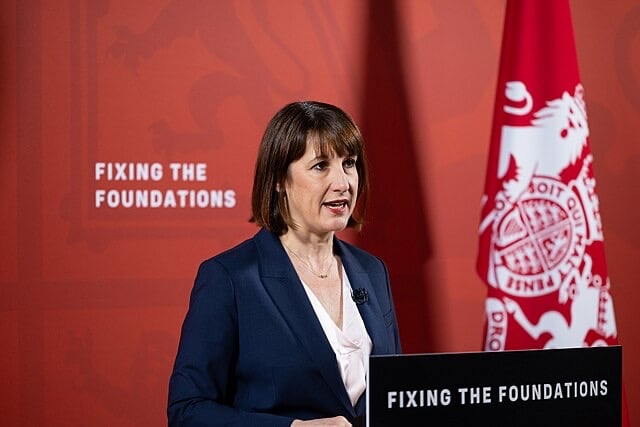UK borrowing costs surged close to 27-year highs yesterday amid claims that Britain is “drifting without an anchor” and facing a damaging “moron premium” on its debts.
The latest sell-off in government bonds, known as gilts, piled fresh pressure on Chancellor Rachel Reeves ahead of this autumn’s Budget following warnings she could require a 1970s-style International Monetary Fund bailout.
Yields on 30-year gilts – which rise as prices fall – climbed to over 5.6 per cent, a whisker away from a peak in April when they hit the highest level since 1998, threatening to squeeze the Government’s headroom for public spending.
Markets sound alarm over fiscal drift
Shadow Chancellor Mel Stride said of the gilts sell-off: “This is what happens when you spend and borrow like there’s no tomorrow.”
Simon French, chief economist at City broker Panmure Liberum, said a “moron premium” on borrowing – a term first used to describe bond market reaction to Liz Truss‘ disastrous 2022 mini-Budget – had made a comeback since Ms Reeves’ Spring Statement.
“Bond market pricing suggests UK fiscal policy is drifting without an anchor,” Mr French warned, suggesting markets had lost confidence in the Government’s ability to control spending and debt.
The gilt moves yesterday partly reflected wider global bond market jitters over inflation concerns. But they also represented a less than favourable verdict on Labour’s fiscal management and reported plans to bring in left-wing pensions minister Torsten Bell to help write the Budget.
Bell appointment sparks market concerns
Julian Jessop, economics fellow at the Institute of Economic Affairs, said markets were “not thrilled” about Mr Bell having a bigger say “presumably because this makes spending cuts even less likely.”
The appointment of Bell, known for his advocacy of higher taxes and expanded public spending, has heightened concerns that Labour will prioritise ideological commitments over fiscal discipline.
The Chancellor faces a dependency on investors who finance Britain’s borrowing by buying gilts but are now worried about her ability to balance the books. Forecasts suggest she faces a financial black hole of up to £50 billion, with limited options to fill it.
Stock market gloom spreads
The gloom extended beyond the bond market as Deutsche Bank experts sounded the alarm over rising unemployment and consumer caution. Their analysis warned that “the end of 2024 and early 2025 are likely to have been a sweet spot with real wage growth set to slow and fear of unemployment set to build from here.
UK retail shares tumbled on the warnings, with Primark owner Associated British Foods down 4 per cent, B&Q owner Kingfisher off by 4.3 per cent and Wickes plunging 8.6 per cent.
The FTSE 100 index retreated from a record closing high seen last week, falling by 55.6 points or 0.6 per cent as investors fled UK assets.
IMF bailout spectre returns
Leading economists warned over the weekend that Ms Reeves could be on course to follow in the footsteps of Denis Healey, the Labour Chancellor who was forced to go cap in hand to the International Monetary Fund in 1976.
The comparison is particularly damaging for Labour, evoking memories of economic crisis and national humiliation when Britain required emergency loans from the IMF to stabilise sterling and public finances.
Rating agency Fitch added to the pressure on Friday, sounding the alarm over the success of Labour backbenchers in derailing welfare reforms and winter fuel payment cuts – which it said had increased the risks of failing to make the sums add up.
Tax raid speculation intensifies
Ms Reeves looks increasingly likely to respond to the pressure by staging a mammoth tax raid in the autumn Budget. Speculation suggests the Chancellor could target pensions, property sales, or inheritance tax – or hike taxes for hard-working families by stealth by freezing income tax thresholds.
But critics say that risks doing even more damage to an already fragile economy. Tory business spokesman Andrew Griffith said the latest increase in gilt yields showed that “Labour’s reckless spending is hammering taxpayers.
“Every time this rate goes up, it’s an even heavier burden on the shoulders of the next generation. We’ve got a huge problem on our hands, and cutting spending is the only way to solve it,” he added.
Employer tax damage mounts
The fear is that further tax hikes could compound damage already inflicted by the Chancellor’s previous Budget, when she announced a £25 billion raid on employer national insurance contributions.
That has made it more expensive for employers to hire – especially affecting low-paid or part-time staff – and been blamed for a rise in unemployment already visible in the latest data.
Deutsche Bank analysts warned that consumer confidence appeared to “remain subdued” and that according to their “fear index” of economic indicators “things may be getting worse.”
Global factors compound UK woes
While the gilt sell-off partly reflected global bond market concerns about inflation and economic growth, UK-specific factors have made British government debt particularly vulnerable.
The spread between UK and German 10-year bond yields has climbed to worrying levels, indicating investors demand a higher premium to hold British debt compared to other developed nations.
This “moron premium” – the extra cost Britain pays to borrow because of perceived policy incompetence – threatens to become a permanent feature of UK government financing unless confidence can be restored.
As autumn approaches, Rachel Reeves faces an increasingly impossible choice: impose further damaging tax rises on an already struggling economy, break her fiscal rules and risk market panic, or implement spending cuts that would alienate her party’s base. With borrowing costs soaring and growth stalling, the spectre of IMF intervention no longer seems as far-fetched as it once did.
Follow for more updates on Britannia Daily
Image Credit (Shortened):
Rachel Reeves delivering a public finances statement (29 July 2024) – by Unknown photographer / HM Treasury, licensed under OGL v3.0, via Wikimedia Commons.



